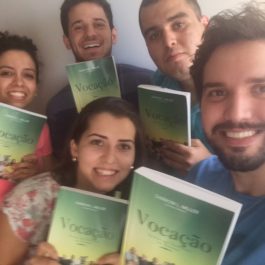Every three years the largest association of mission agencies in Brazil puts together the largest missions conference in Brazil (the Brazilian Congress of Missions). Churches and organizations from all over the nation participate.
Last year they hosted their first missions conference targeting youth 17 to 25. The idea of such a gathering occurred to the leaders after reading Darrow’s book, LifeWork: A Biblical Theology for What You Do Every Day. DNA global leadership team member, Nelson Monteiro, viewed the gathering as “a very strategic meeting … [an] opportunity to challenge the Brazilian Christian young people who are looking to make a difference in society through their vocation and that are not necessarily hearing that message in their churches.”
 Among those who heard Darrow’s teaching was Murilo Lucinidias and a group of friends. Hearing Darrow speak about biblical worldview and the dichotomy of sacred/secular thinking “set us free,” Murilo says. This message “has taken a burden from our back.”
Among those who heard Darrow’s teaching was Murilo Lucinidias and a group of friends. Hearing Darrow speak about biblical worldview and the dichotomy of sacred/secular thinking “set us free,” Murilo says. This message “has taken a burden from our back.”
Murilo went on to elaborate.
One moment in the teaching was a tipping point in my life. Darrow was preaching about calling and vocation, and teaching that there is no division such secular/sacred life for believers. Everything is sacred if lived before the face of God. God values the work of a farmer, engineer, bellboy as much as the work of a pastor, and so on.
These things were exploding like bombs in my chest. All of a sudden I understood the idea and a phrase came out from my mouth automatically: “So, I don’t need to be a pastor?! I do not need to be a pastor!!!” Now I’m working to be the best businessman I can.
Priscila shares,
In my work, I have been transforming my mindset and improving my work time. In what I do, I do it for the Glory of God. He is the boss. And He put me at the gate of grains commercialization and that’s a huge deal.
Since the system is open, I felt hope. We do not need to become slaves of problems that show up. Since we have the creative mind of God, we can (by His grace), be creative and not be conformed by the situation.
Rebeca also expressed her appreciation.
I am a personal trainer, and I work in a health club. The book and the time with Darrow Miller in Brasília made me think more about the “why’s” of exercise. Those thoughts led me to create a project to make people aware of the genuine importance of physical activity.
The other thing I started to do was bring beauty to my work place, so I bought pots, kitchen carpet, new cutlery and an interior diffuser, just to make my workplace cozier.
Besides these individual reflections, these young people have started a group study of Darrow’s book LifeWork. The group is using a particular method for this study. Here’s Murilo’s description of how it works:
Here in Brazil we are using something we call the “Cumbuca Method” of group study. A cumbuca is a little container where you can put water, or soup, or other things. This method helps people maintain discipline and consistency in reading, and encourages us to confront ideas in a deeper way. It works like this:
- Form a group of 4-6 people.
- Meet weekly for two hours. It’s important to meet on the same day and at the same time. Either home or classroom works fine, but be sure you have a cumbuca! (see below)
- All group members study one chapter each week. If someone has not studied or is absent, the meeting is cancelled that week. The purpose is not to say “shame on you” but to build commitment and, mainly, to show that the group is more important than the individual.
- All participant’s names are placed in the cumbuca. At the beginning, a name is drawn. That person first makes a presentation of the assigned chapter. Then he or she leads a group discussion on that chapter. Since everyone has done the reading, the discussion is generally very good.
- After the draw the name returns to the cumbuca (which means the same person may be drawn the next week!)
Murilo says, “It’s a good way to spread the ‘virus,’ as Darrow calls the biblical worldview, to other people that weren’t in the conference.”
And in fact, that’s exactly what has happened: the original gathering has now multiplied to four groups!



